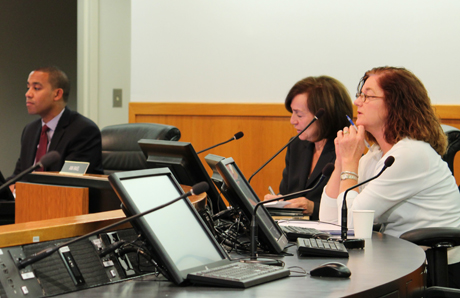Discussion on technology dominated much of the Fair Political Practices Commission‘s June 20 meeting in the Santa Clara County Board of Supervisors chambers, as the state political watchdog discussed the role of monitoring campaigns, candidates and elected officials in between dealing with some technical difficulties in setting up its equipment.
The FPPC regulates and monitors political activity across the state, including campaign financing, lobbying, and financial conflicts of interest. The five-member, bipartisan commission, which is supplemented by a staff of roughly 80 people, not only enforces existing campaign laws but also works for further reform through advocating new legislation. The FPPC’s meeting in San Jose was part of the Sacramento-based agency’s efforts to increase public awareness of the commission and its activities.
“We are a statewide organization, we impact so many people, and we have an important role in disclosing information about the political system to people, but people don’t know about our existence,” said FPPC Chair Ann Ravel, a former Santa Clara County Counsel. “Part of what I consider my obligation is to go around and try to give information to people about what we do.”
President Obama recently nominated Ravel to head the Federal Election Commission. Ravel has served on the FPPC since March 2011, when Gov. Jerry Brown appointed her as the watchdog agency’s chair. She previously served as lead counsel for Santa Clara County.
At last month’s meeting, Ravel found herself back in the same chambers where she’d served as county counsel, and in a seat previously occupied by disgraced former county supervisor George Shirakawa, Jr., who was fined $50,000 by the FPPC in April for hiding and illegally using campaign funds. Shirakawa is awaiting sentencing for five felonies and seven misdemeanors related to his misuse of campaign and public funds.
But the FPPC’s recent meeting did not involve Shirakawa or his former ally, San Jose Councilman Xavier Campos, the subject of an ongoing FPPC investigation. Instead, the commission focused on technology’s capacity to aid the watchdog agency.
The commissioners, their executive staffers and citizens in attendance discussed a proposed statue that would regulate blogs and other online content that are sponsored by a political campaign. “We believe people have a right to information,” Ravel said. “That’s the reason for the desire for greater disclosure about who’s paying for political campaigns on blogs and the like, which are now unregulated.”
The commission will vote on the matter in August.
FPPC senior counsel William Lenkeit noted the important role Google Maps has had in helping the agency identify the effects of governmental decisions on elected officials’ property interests.
“The first thing we do is put in the address and look at Google Maps,” Lenkeit said. “It’s easier to look at the property and get an idea [of a decision’s effect]. I can see what this does. I can see what the benefits are—a picture tells a thousand words.”
In the future, Ravel hopes the FPPC will continue to use the Internet to advance its mission, such as enabling the online filing of form 700s, in which government officials disclose their outside economic interests. “It’ll be a great benefit not only to the people who have to file but also to the public who have to get information,” she said.
“I think that the Internet and online issues are crucial for the FPPC. [We need] to be able to use an online presence to give information to more people … and to encourage people to participate in the political system.”

